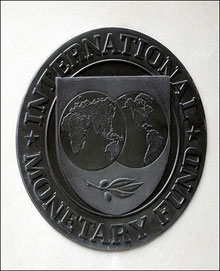WASHINGTON - The US government is backing a bigger IMF role for China
heading into the global body's annual meeting next month in Singapore, an
official said.
But the administration could run into trouble with congressional critics of
Chinese trade practices.

The International Monetary Fund seal is seen
in Washington, DC. The US government backs a bigger role at the IMF for
China heading into the global body's annual meeting next month in
Singapore, an official said. [AF] |
Treasury spokeswoman Brookly Mclaughlin confirmed the thrust of an interview
given to the Washington Post by Tim Adams, the deputy Treasury secretary for
international affairs, who endorsed China's claim for more IMF voting rights.
"But it's not just China," she said.
"He (Adams) expressed support for the idea of providing a small ad-hoc
increase to the four countries that are underweight in every variable of the
current quota calculations -- China, South Korea, Turkey and Mexico -- as part
of a first step toward broader IMF reform."
At the annual meetings of the International Monetary Fund and World Bank, the
Fund says it will press ahead with plans to revamp its voting structure to give
more influence to fast-developing countries.
But some US critics oppose any increase for China's IMF influence unless the
booming country takes rapid steps to revalue its currency, whose relatively
cheap value has encouraged an explosion in Chinese exports.
Under one bill sponsored by two influential senators, the US administration
would be compelled to veto any increase in the IMF vote of a country with a
"fundamentally misaligned" currency.
In his Washington Post interview, however, Adams said the currency debate was
intrinsic to IMF reform.
"We need to fix it, if this is going to be the institution leading the charge
on currency regimes and so forth," he was quoted as saying.
"This institution needs to be seen as credible so all participants feel that
it truly represents them."
Despite its newfound status as the workshop to the world, China has less
voting power at the IMF than Belgium and the Netherlands combined. The Fund
remains dominated by the United States, European countries and Japan.
Adams said that at the September 19-20 meetings in Singapore, "hopefully
we'll be able to bless" a deal that would give China, South Korea, Mexico and
Turkey "a down payment" in terms of their IMF power.
A more far-reaching reallocation of votes could come later, he suggested.
IMF spokesman David Hawley said the Fund's board had discussed a quota
reallocation at a meeting Wednesday, including for the four countries cited by
Adams.
The quotas determine how much a member contributes to the Fund, its voting
rights and access to financing.
"We expect that this work ... will continue in the coming days with the aim
of reaching agreement on a package by the annual meetings in Singapore," Hawley
told reporters.
"We remain optimistic that that objective will be met," he said.
The US government sees reform of the IMF as central to its goal of redressing
global economic imbalances, which have frequently been cited by Fund chief
Rodrigo Rato as one of the biggest menaces to world growth.
China's red-hot growth and the petrodollar bonanza enjoyed by oil exporters
have combined with soaring US trade deficits to leave the global economy
dangerously out of kilter, Rato has warned.
Speaking in Tokyo three weeks ago, the IMF managing-director said the
Singapore meeting should see immediate changes to the voting powers of
under-represented members.
"It's important, not so much to change the direction of the institution but
to give it stronger credibility, that the most dynamic economies get the
representation their real economic weight represents in the world," he
said.